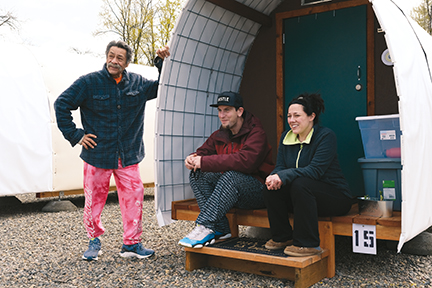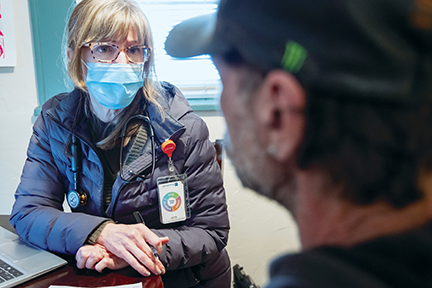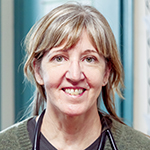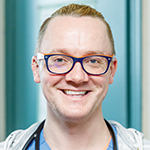By JULIE MINDA
Accessing medical and mental health care can feel like an insurmountable task for people who are unhoused and mired in addiction, mental illness or declining physical health.
A team from a PeaceHealth safety net clinic in Eugene, Oregon, is working with residents of organized homeless communities run by a nonprofit to ease their access to the health system and social services.

Residents of one of Community Supported Shelters' sites gather on the porch of a sleeping hut. Clusters of huts create transitional housing communities in Eugene, Oregon.
"We ask: 'What are the barriers to care?' And then we address those barriers," says Angela Bradley, a nurse practitioner with PeaceHealth Oregon's Unified Care Clinic in Eugene. "Most of the people we're working with at the shelter haven't seen a health
care provider in many years." Most of them have serious untreated medical and mental health conditions, she says.
The clinic outreach group — which normally includes a family nurse practitioner, nurse case manager, admissions counselor and peer support worker — spends several hours a week at the main hub of Community Supported Shelters, the organization
that operates numerous clustered hut encampments around Eugene. The visiting team members provide some basic medical care like wound dressings and they guide individuals in need to primary medical and mental health care at the Unified Care Clinic.
Different brand of care
Unified Care Clinic treats patients who may no longer be welcome at other clinics because of behavior issues, noncompliance with medical instruction or because of drug seeking. "Drug-seeking behavior
is common among all populations — it is just more stigmatized when it is a feature of someone who is unhoused or lower income," says Alex Holmes, a nurse case manager for Unified Care Clinic.
Clinic nurse practitioner Kathy Kernan adds that patients at the Unified Care Clinic "feel they're not judged by our team, they feel welcomed. We invite them to come in. They can grab a cup of coffee and chat with us. We have same-day appointments.
We're different from others."
Bradley says that unlike many health care clinics, the Unified Care Clinic will treat patients even if they're not sober or if they are in a symptomatic mental health crisis.
Clinic staff — usually the peer support specialist or case manager — assists patients in accessing long-term treatment for addiction and mental health problems and social service staff can provide referrals to housing and transportation
assistance, job training programs and food aid.

PeaceHealth nurse practitioner Kathy Kernan meets with patient Jeffrey Thompson, who lives in a hut at a Community Supported Shelters transitional housing encampment in Eugene, Oregon.
Helping patients secure stable housing and addiction treatment is especially challenging because there is an affordable housing shortage in the Eugene area and wait lists for drug-dependency recovery programs. As clinic staff searches for open slots
in treatment programs, Holmes says its clinicians practice harm reduction by providing "nonjudgmental care," medications to counter opioid cravings, and counseling.
Outreach mission
Holmes says the clinic's shelter outreach began several years ago. Clinic staff wanted to extend the clinic's services to people who had no contact with any health provider in the Eugene area. Their
first outreach was to a 29-unit transitional living community in Eugene called Opportunity Village. It gives people experiencing homelessness a place to regain a sense of community and some stability as they seek permanent housing.
When the PeaceHealth team had exhausted its list of prospective patients at Opportunity Village, staff there recommended that the clinic team connect with Community Supported Shelters. That organization has established 14 safe spot communities in
the Eugene area, with a total of 144 huts. Safe spot communities are "legal, designated places for people who are without a conventional form of housing," according to Community Supported Shelters' website.
The huts are transitional housing for adults only. Most residents stay about 10 months.
Each hut has a metal, arch-shaped frame, plywood base and vinyl covering. The interior is about 60 square feet, and there is a 20-square-foot porch. The organization says the huts' "simple design uses a minimum of materials" to achieve a safe shelter
option.
The huts do not have air conditioning or running water but provide a buffer from the elements and a secure place to store belongings. The residents can use their own propane heaters. The huts have insulation, and Community Supported Shelters offers
residents sleeping bags, wool blankets, socks and hats.

An aerial view of the huts at a transitional housing encampment operated by Community Supported Shelters in Eugene, Oregon.
Each camp has a communal kitchen and port-a-potties. Community Supported Shelters' main hub, which it calls its Reboot Station, has showers, a closet with extra clothing and hygiene supplies, and coffee and snacks. At the hub is the organization's
main office, where staff, including social service navigators, work. A shuttle runs between the organization's transitional housing communities and the Reboot Station.
The basics
During their three-to-four-hour visits to the Reboot Station every other week, the PeaceHealth team meets with shelter residents who have signed up for appointments and offers unscheduled visits to those
without appointments. If there is a need, the PeaceHealth team stops in at other Community Supported Shelters locations.
At the Reboot Station, the visiting team starts to establish a relationship with the residents and talks with them about their medical and mental health needs. The goal is to prepare them to become patients of the Unified Care Clinic.
PeaceHealth team members complete a baseline assessment of the needs of each patient, creating a record for the individual in the PeaceHealth electronic medical record. Only those not already accessing health care elsewhere are a match for the team's
services. Team members help patients who qualify for coverage to fill out Medicaid enrollment forms. At the Reboot Station, the visiting team's clinicians can provide basic health screenings, blood pressure checks and simple wound care. The nurse
practitioner can write prescriptions that patients must pick up, usually at the pharmacy of their choice.
Once the residents are linked into the PeaceHealth and Unified Care Clinic system, the clinic team provides comprehensive support to get them mental and medical health services. So far about 20 patients have made the United Care Clinic their medical
home, and the team is building trust with others who may one day seek preventive and acute care at the clinic.
Bumpy path to care
Kernan says it is usual for patients at the encampments to have substance abuse issues, mental health needs and unmanaged chronic illness such as uncontrolled diabetes.
Some of the patients from the encampments cycle in and out of health care as periods of relative stability are punctuated with drug relapses or acute mental illness.
Others, like Jeffrey Thompson, 55, find firmer footing. Thompson is a Community Supported Shelters resident who met with the visiting Unified Care Clinic team in December. He and his wife and their two dogs have been living in huts at one of Community
Supported Shelters' sites since October. The property where they'd previously lived was sold, and the couple is wait-listed for an affordable rental unit from the St. Vincent de Paul Society. Thompson had worked as a landscaper for more than two
decades, mainly in the Eugene area, but quit that work last year. His wife is permanently disabled.
Thompson had untreated hypertension for years and has unresolved dental issues. He has visited the Unified Care Clinic multiple times since his initial meeting with the outreach team. He's getting his blood pressure under control with prescription
medication and that could pave the way for him to get his teeth fixed by an organization that told him they could not treat him until his blood pressure was lower. (The Unified Care Clinic does not provide dental care but does help patients access
that care elsewhere.)
He says of unhoused people like him: "We need help and can't get it. It's very difficult to get health care. But now I've found the right people to talk to and continue on the path to get care. I don't know where I'd be without Community Supported
Shelters and the Unified Care Clinic. They are angels."
Clinic welcomes people whose lot in life made care unattainable
Nearly a decade ago, PeaceHealth was seeking a way to provide integrated primary and behavioral health care to patients who have trouble accessing the health system, often because of mental illness, substance dependence and homelessness.

Kernan
In its Eugene, Oregon, market PeaceHealth recruited nurse practitioner Kathy Kernan to establish a practice geared to these vulnerable people, using grant funding from the Trillium Community Health Plan, a Medicaid coordinated care organization.
Kernan designed the Unified Care Clinic, a primary care and mental health clinic especially for people who are "failing in primary care" by not making or showing up for appointments, and using emergency departments for urgent or routine care.
Alex Holmes is a nurse case manager for the Unified Care Clinic. He says other clinics and providers have refused to continue caring for people with mental and behavioral disorders. The practices may be unprepared to manage erratic behavior or meet
the complex comorbidities of mentally ill patients, some of whom are dependent on illicit drugs.

Holmes
"Primary care providers often feel ill-equipped to help and prescribe to (these patients) without having access to a psychiatrist or psychologist to assist with the diagnosis and prescription process," Holmes says.
Holmes says clinics for the indigent often have strict policies that remove patients from their rosters for missing appointments. Patients at the Unified Care Clinic are never dismissed for missing appointments. Holmes says that liberal policy can
hurt his clinic's financials "but is necessary for the population we see."
Holmes says the Unified Care Clinic accepts patients who have been "violent or otherwise inappropriate" in other medical settings and frequent no-shows at appointments. Clinic staff is patient with them, while adhering to strict safety protocols.
The clinic team strives to provide reliable, consistently nonjudgmental care, irrespective of a patient's treatment compliance or progress. Holmes adds that generally as a patient's health improves, that person's life situation and behavior improve.
Kernan has grown her team over the past eight years to include nurse practitioners, case managers, master's trained counselors, support specialists and others. The Unified Care Clinic is located in a PeaceHealth Medical Group building across the street
from PeaceHealth Sacred Heart Medical Center, University District. The clinic has several provider offices, five exam rooms and about 10 rooms for counselors and other staff.
Patients are usually referred to the Unified Care Clinic from the emergency department of PeaceHealth's Eugene hospital, from outpatient clinics within the PeaceHealth network or from individual providers within the Oregon Medical Group clinician
network.
The Trillium funding ended several years ago, and PeaceHealth since has been picking up expenses not covered by Medicaid reimbursement. Kernan notes Unified Care Clinic saves the Medicaid program money because clinic patients get better care and use
the emergency department much less frequently for nonemergency conditions than they did before they had a primary care medical home.
Holmes notes the clinic is
mission-driven and losses it incurs due to its liberal no-show policies and other differentiators are subsidized by PeaceHealth foundations, donors and state grants.
— JULIE MINDA